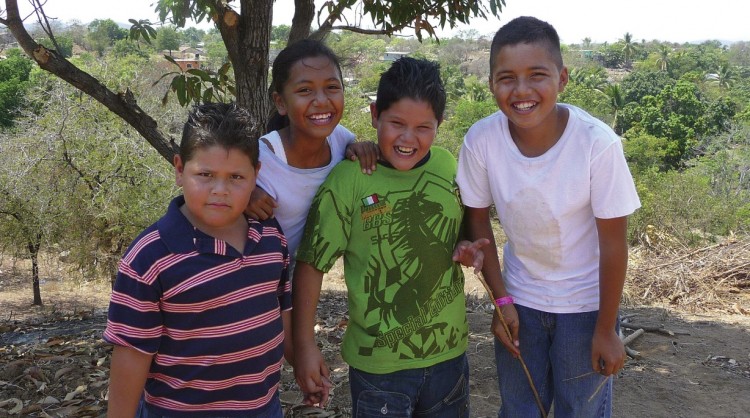
Redefining Service through Servant Leadership
Jeffrey Rathlef
In no other way have the principles and characteristics of servant leadership been more personally and professionally relevant and meaningful to me this year than through the recent execution of a new international short-term alternative spring break service-learning program with our newly established Mexican sister city. Servant leadership has provided a new “lens” through which to approach, develop, and execute a program designed to help re-conceptualize the notion of service itself.
This program, entitled “Learning to Serve,” was an international service experience based on a new premise, an integrated dynamic and fresh perspective. The goals of the Learning to Serve program focused on enhancing mutual understanding between Saint Peter, Minnesota and Petatlán, Mexico by seeking out, learning about, and sharing local perspectives from Petatlán residents on their sense of community, health and well-being environmental stewardship, identity, and purpose.
Professional displays encompassing students reflections and learning on their own experiences, combined with the voices and perspectives from Petatlán residents wove together an interpretive story in the form of banners, which culminated in a collective celebratory student presentation, and public exhibit at the Historical Society’s Saint Peter History Center upon return from Petatlán. To carry this out, Gustavus students engaged medical, educational, and environmental professionals, as well as local students and residents in project-driven encounters and interactions. Throughout their placements, homestays, and program excursions, students engaged Petatlán residents in semi-structured interviews aimed at capturing diverse perspectives on the community of Petatlán. Students then worked individually and collaboratively to design banners depicting what students had taken away from the stories and what their own reflective learning and experiences revealed to them through the interview process. The culminating exhibit invites those who encounter it to learn about Petatlán from local voices, reflect on the common good between them, and consider one’s own sense of identity and purpose within their own community.
At the heart of the vision behind Learning To Serve was the recognition that the greatest shared need and common good was building a global community between newly-established sister cities. Service was re-conceptualized from what might have otherwise been an emphasis on volunteer activities on the ground in Petatlán towards facilitating meaningful interactions with local residents for the purpose of capturing and honoring their stories and perspectives and bringing them home. The interpretive story project both framed and constructively charged students to interact, listen, ask questions, and engage. Indeed, building a global community between two sister cities gave meaning and purpose to what students were in Petatlán to do, and that purpose required them to employ strategies of deep listening, empathy, connecting, and commitment to the growth of others to achieve their service objective. The characteristics of servant leadership helped students re-consider, re-conceptualize, and understand service in a new way.
I believe servant leadership poses new possibilities for approaching, framing, and evaluating the success of short-term international service endeavors. Servant leadership balances what is commonly an over-emphasis on the “what,” – the things or activities one is going to do – with the “how” and “why” – the purpose, meaning, and objective behind them. For international service in particular, this is important for it introduces reflective opportunities to address many of the tough questions and ethical dilemmas associated with many common expressions of international service.
While there are certainly many effective and meaningful international service-related engagements, grounded in and driven by strong partnerships, there are equally many common critiques surrounding them, most notably, volunteer “do-gooder” brigades who travel abroad to “help,” but who typically do not speak the language, understand the culture, have a long-term invested interest, and who perhaps don’t always critically reflect on the power, privilege, and ethical considerations associated with their endeavor in the first place. For Learning To Serve, servant leadership helped address some of those ethical considerations by taking the emphasis away from “doing something” in Petatlán and replacing it with simply “being present and engaged” with the community – learning first, and serving second. Indeed, some of our staff observed that once students let go of their pre-conceived notions surrounding what an international service program should be or entail, they found it was both different, and better than what they had expected.
On the last day of the program in Petatlán, I posed the group with a modified version of Robert Greenleaf’s “Best Test,”, and asked, “What evidence do we have that the people in Petatlán are somehow better off by virtue of our presence here?” “Did they grow as persons?” “Are they somehow freer, wiser, more autonomous, more likely to serve others?” “And what about the least privileged in society?” “Are they at a minimum not further marginalized?” (Greenleaf, 1970) While the group struggled to answer these questions, I was inspired by the questions themselves. The best test virtually eliminated much of the stigma associated with First World vs. Third World rhetoric and interactions that tend to pose other types of questions such as “How did we help?” “What did we do?” “How do we feel about our experience?” “What have we gained?” While those are not necessarily bad questions in and of themselves, they do tend to share one single common denominator – a focus on “we.”
I have always felt that one of the world’s great needs around service was to continually search out and embrace opportunities to critically examine the premises and assumptions surrounding service itself. While I am passionate and deeply committed to service, I also recognize the many dilemmas and pitfalls associated with it – for example, doing service for the sake of service, service that is not perceived or felt as service by those “being served,” service that perpetuates dependency, the status quo, power and privilege, service that is oppressive, etc. I think servant leadership provides a fresh lens and perspective by which to not only critically examine service itself, but re-conceptualize it in ways that can change the face of human outreach, mutual growth, and solidarity in the world.
About the Author
JEFFREY S. RATHLEF is Director for Community-Based Service and Learning and Associate Director of the Center for Servant Leadership, Gustavus Adolphus College. As Director for Community-Based Service and Learning within the Center for Servant Leadership, Mr. Rathlef oversees a robust portfolio of on-going co-curricular service programs, and facilitates and supports faculty in curricular community-based learning. In addition, Jeffrey facilitates the development of meaningful campus/community partnerships in support of civic engagement between Gustavus Adolphus College and the local Saint Peter community and broader southern Minnesota region. A native of Kansas, Jeffrey holds B.S. in Horticulture and B.A. in History from Kansas State University where he also coordinated the university’s S.A.V.E. (Students Assisting Volunteer Efforts) for the university community service center. Upon graduation from Kansas State, Mr. Rathlef entered the Ecuadorian branch of the U.S. Peace Corps where he assisted rural community development efforts en a small community in the Andean highlands. Jeffrey conducted his graduate work (M.A. Latin American Studies and M.A. in Cultural Studies in Education) at Ohio University where he worked as the on-site coordinator for one of the university’s study abroad programs based in Cuenca, Ecuador

